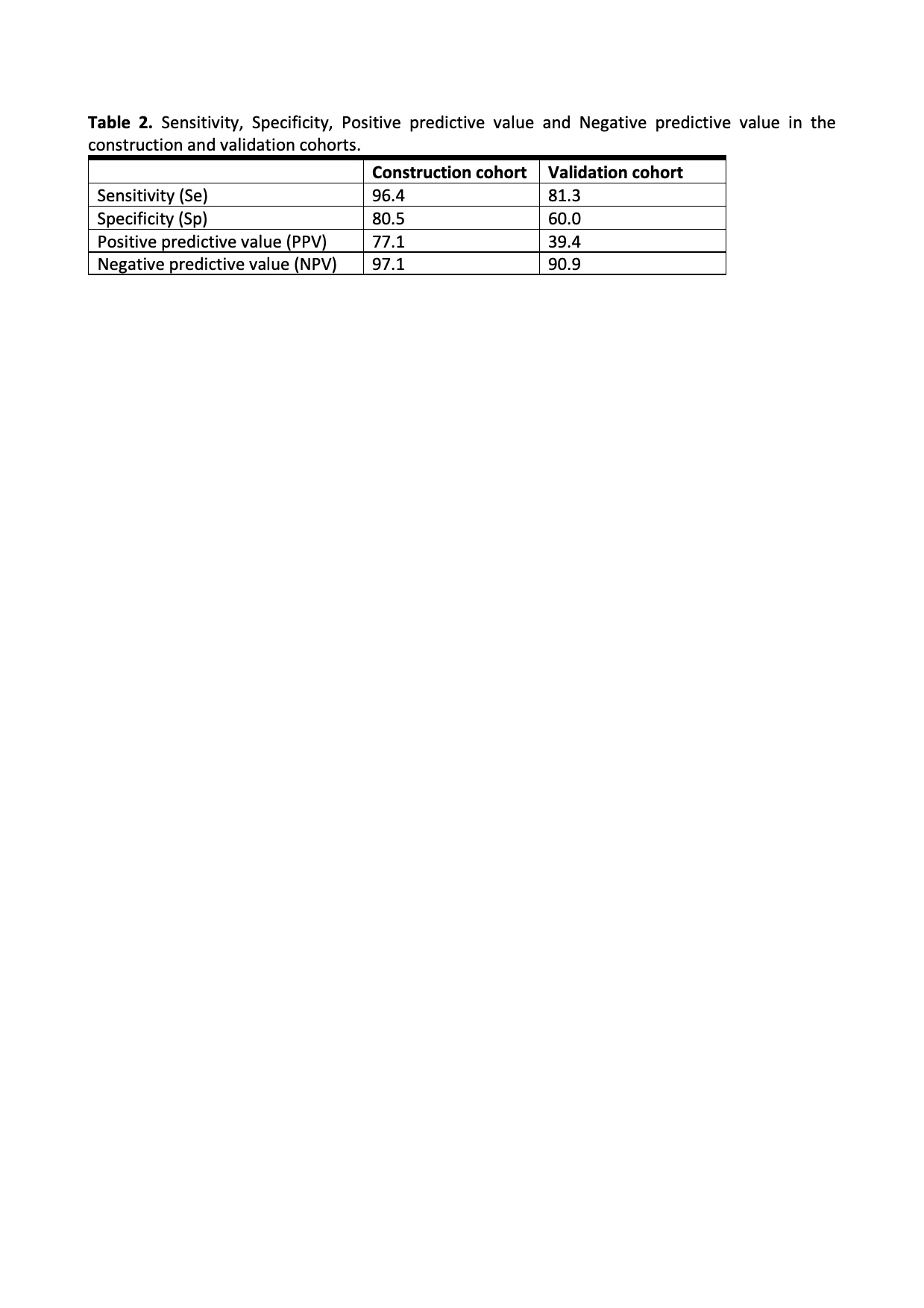Session Information
Date: Sunday, November 8, 2020
Title: Pediatric Rheumatology – Clinical Poster II: Systemic JIA, Autoinflammatory, & Scleroderma
Session Type: Poster Session C
Session Time: 9:00AM-11:00AM
Background/Purpose:
Macrophage Activation Syndrome (MAS) is a severe, life-threatening, complication of Systemic Juvenile Idiopathic Arthritis (sJIA) with a significant mortality. A score that identify sJIA patients with high risk to develop MAS would be useful in clinical practice.
Methods:
We evaluated whether routine laboratory parameters at disease onset may predict the development of MAS in patients with sJIA and we defined a risk score of MAS using these parameters. Then, we validated the score in a second population. Laboratory parameters of disease activity and severity were retrospectively evaluated in 99 sJIA patients referred to Bambino Gesù Hospital in the last 10 years with at least 2 years of follow-up. Laboratory parameters were evaluated during active sJIA, without MAS, at disease onset or disease flare, immediately before treatment for sJIA was started or modified. Patients were divided in two groups: sJIA patients without MAS in the 2 years of follow-up and sJIA patients with at least one MAS episode. To create the MAS risk score, laboratory parameters with a statistically significant difference between the 2 groups were selected.
Results:
Thirty patients, that fulfilled the 2016 classification criteria for MAS [1] at time of sampling, were excluded from the analysis. Therefore, we analysed laboratory parameters of 69 sJIA patients, 41 without MAS in the follow-up and 28 with at least one episode of MAS. Levels of ferritin, AST, LDH and triglycerides were significantly higher in patients with MAS during follow-up compared to those without. Their respective cut-off were computed by means of ROC curve analysis. A regression coefficient-based scoring system was used to assign weights to the risk index and the optimal score cut-off was defined by ROC curve analysis (Table 1). A MAS risk score >5 identified 27 out of 28 sJIA patients with MAS during the follow-up and 8 out of 41 sJIA patients without MAS. Sensitivity (Se), specificity (Sp), positive predictive value (PPV) and negative predictive value (NPV) of the score are detailed in table 2. In order to validate the MAS risk score on a different population, we applied the score on 132 sJIA patients from other pediatric rheumatology centers, 100 without history of MAS and 32 with at least one episode of MAS. Se, Sp, PPV and NPV of the score are reported in table 2.
Conclusion:
In conclusion we developed a MAS risk score based on routine laboratory parameters, available worldwide, that can help clinicians to identify early in the disease course sJIA patients with high risk to develop MAS.
Reference:
1. Ravelli A et al. Ann Rheum Dis. 2016 Mar;75(3):481-9.
To cite this abstract in AMA style:
Carbogno S, Pires Marafon D, Marucci G, Sacco E, Pardeo M, Alsaleem A, Fingerhutova S, Demir F, Cekada N, Kostik M, Kessel C, Vougiouka O, Gagro A, Tibaldi J, Minoia F, Maccora I, Schneider R, Dolezalova P, Sozeri B, Jelusic M, Insalaco A, De Benedetti F, Bracaglia C. Risk Score of Macrophage Activation Syndrome (MAS) in Patients with Systemic Juvenile Idiopathic Arthritis (sJIA) [abstract]. Arthritis Rheumatol. 2020; 72 (suppl 10). https://acrabstracts.org/abstract/risk-score-of-macrophage-activation-syndrome-mas-in-patients-with-systemic-juvenile-idiopathic-arthritis-sjia/. Accessed .« Back to ACR Convergence 2020
ACR Meeting Abstracts - https://acrabstracts.org/abstract/risk-score-of-macrophage-activation-syndrome-mas-in-patients-with-systemic-juvenile-idiopathic-arthritis-sjia/


